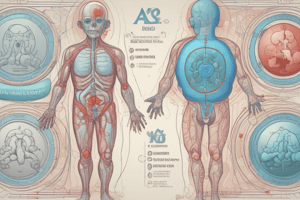Podcast
Questions and Answers
What primarily causes Type 1 Diabetes Mellitus?
What primarily causes Type 1 Diabetes Mellitus?
- Deficiency of incretin hormones
- Age-related hormonal changes
- Insulin resistance leading to increased glucose production
- Autoimmune destruction of pancreatic β-cells (correct)
Which of the following statements about Amylin in Type 1 DM is true?
Which of the following statements about Amylin in Type 1 DM is true?
- Amylin is co-secreted with insulin from pancreatic β-cells (correct)
- Amylin is adequately produced in Type 1 DM
- Amylin functions to increase glucagon secretion
- Amylin promotes rapid gastric emptying
What percentage of diabetes cases does Type 2 DM represent?
What percentage of diabetes cases does Type 2 DM represent?
- 50%–60%
- 100%
- 90%–95% (correct)
- 5%–10%
In Type 2 DM, what is primarily responsible for impaired insulin secretion over time?
In Type 2 DM, what is primarily responsible for impaired insulin secretion over time?
What is a characteristic feature of insulin resistance in Type 2 DM?
What is a characteristic feature of insulin resistance in Type 2 DM?
Flashcards
Type 1 Diabetes
Type 1 Diabetes
A chronic condition characterized by the immune system destroying insulin-producing cells in the pancreas, leading to absolute insulin deficiency.
Type 2 Diabetes
Type 2 Diabetes
A chronic condition characterized by the body's inability to use insulin effectively, leading to high blood sugar levels.
Insulin Resistance
Insulin Resistance
The body's cells are unable to respond to insulin properly, leading to high blood sugar levels.
Amylin
Amylin
Signup and view all the flashcards
Incretin Hormones
Incretin Hormones
Signup and view all the flashcards
Study Notes
Type 1 Diabetes Mellitus (DM)
- Accounts for 5-10% of cases.
- Characterized by the pancreas's inability to produce insulin.
- Primarily caused by autoimmune destruction of pancreatic beta-cells.
- Results in an absolute insulin deficiency.
- Can affect individuals of any age but is common in children and adolescents.
- Amylin, a hormone co-secreted with insulin, is also deficient.
- Amylin's roles include suppressing inappropriate glucagon secretion, slowing gastric emptying, and inducing central satiety.
Type 2 Diabetes Mellitus (DM)
- Accounts for 90-95% of cases.
- Typically diagnosed in individuals aged 45 years or older.
- Key feature is insulin resistance, characterized by:
- Excessive hepatic glucose production.
- Reduced skeletal muscle glucose uptake.
- Increased lipolysis and fatty acid production.
- Progressive decline in beta-cell mass and function leads to impaired insulin secretion over time.
- Reduced incretin effects (GLP-1 and GIP) further contribute to the condition.
- Gut incretin hormones normally stimulate insulin secretion and suppress glucagon release in response to meals.
Studying That Suits You
Use AI to generate personalized quizzes and flashcards to suit your learning preferences.





